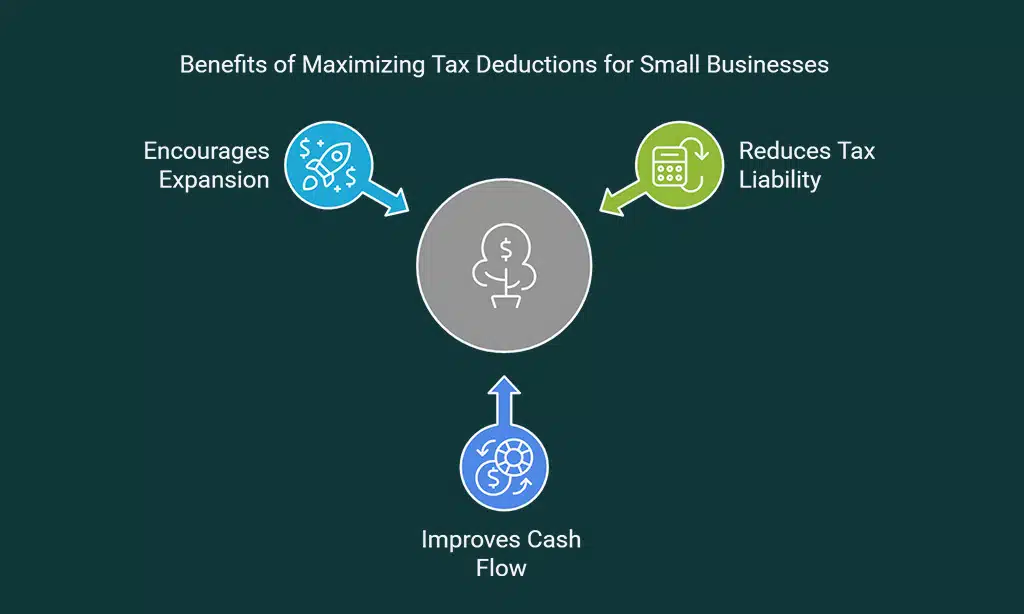Running a small business in Singapore comes with many responsibilities, including managing taxes effectively. Fortunately, the government provides numerous tax deductions to help businesses lower their taxable income and reinvest in growth. Understanding these deductions can save your company significant money each year.
However, many small business owners fail to take full advantage of these deductions due to a lack of awareness or understanding. By strategically utilizing these tax benefits, businesses can significantly improve cash flow and financial stability.
In this comprehensive guide, we will explore 10 tax deductions every small business in Singapore should use, detailing what qualifies, how to claim them, and best practices to maximize savings. We will also provide practical examples, key tables, and the latest industry insights to help you navigate tax deductions effectively.
Understanding Tax Deductions for Small Businesses in Singapore
Tax deductions reduce your taxable income, lowering the amount of tax you owe. In Singapore, businesses can deduct various expenses incurred in generating revenue, provided they meet the requirements set by the Inland Revenue Authority of Singapore (IRAS). These deductions apply to both operational and capital expenditures, ensuring businesses can manage costs efficiently while staying compliant with tax laws.
Why Small Businesses Need to Maximize Tax Deductions?
- Reduces tax liability, freeing up funds for reinvestment.
- Improves cash flow, allowing better financial management.
- Encourages business expansion, with cost savings redirected to growth initiatives.
- Enhances profitability, by optimizing expenses and minimizing tax burdens.
Who Qualifies for These Tax Deductions?
All registered businesses in Singapore, including sole proprietorships, partnerships, and private limited companies, can claim tax deductions if they meet IRAS guidelines. Additionally, businesses must maintain proper documentation and ensure expenses are wholly and exclusively incurred for business purposes.
10 Tax Deductions Every Small Business in Singapore Should Use
In today’s digital world, businesses rely on technology for efficiency and growth. The Singapore government acknowledges this necessity and provides tax relief on IT and software expenses. By leveraging these deductions, businesses can optimize their operational processes, enhance cybersecurity, and stay competitive in the evolving marketplace.
1. Startup and Incorporation Costs
Starting a business involves several upfront costs, including registration, legal consultation, and structuring. Many business owners are unaware that they can deduct these expenses from their taxable income, reducing the initial financial burden.
What Expenses Are Deductible?
| Expense Type | Examples |
| Business Registration | ACRA registration fees, name reservation costs |
| Legal & Consultation | Lawyer fees for incorporation, advisory services |
| Business Structuring | Licensing fees, compliance assessments |
How to Claim This Deduction?
- Maintain records of all related expenses.
- Include these expenses in your first corporate tax filing.
- Work with an accountant to ensure compliance with IRAS regulations.
Example: A new tech startup in Singapore incurred SGD 5,000 in legal and registration fees. By claiming these as deductions, they reduced their taxable income and saved approximately SGD 850 in corporate tax payments.
2. Employee Salaries and CPF Contributions
Investing in employees is essential for business growth, and Singapore’s tax framework allows businesses to claim full deductions on salaries and CPF contributions.
Eligible Payroll Expenses
| Expense Type | Examples |
| Wages & Salaries | Full-time, part-time employee wages |
| CPF Contributions | Employer’s CPF share for local employees |
| Training Costs | SkillsFuture training, professional courses |
Tax Benefits of Hiring Employees
- Reduces taxable income while retaining talent.
- Government incentives such as the SkillsFuture Enterprise Credit (SFEC) further lower costs.
- Encourages workforce upskilling, leading to business efficiency.
3. Rental and Office Space Costs
Whether renting an office or working from home, small businesses in Singapore can claim deductions on rent and related expenses.
Claiming Deductions for Rental Costs
| Expense Type | Examples |
| Office Rental | Commercial property lease payments |
| Co-working Spaces | Membership fees for shared offices |
| Utilities | Electricity, internet, and water bills (for office use) |
4. Business Travel Expenses
Many businesses incur travel costs when attending overseas meetings, conferences, or supplier visits. These expenses are deductible if directly related to business operations.
What Can Be Deducted?
| Expense Type | Examples |
| Transportation | Airfare, taxi fares, train tickets |
| Accommodation | Hotel stays for business trips |
| Meals & Per Diem | Business meals and daily allowances |
5. Advertising and Marketing Costs
Marketing expenses are crucial for brand growth and customer acquisition. Businesses can claim deductions on both digital and traditional marketing expenditures.
Eligible Advertising Expenses
| Expense Type | Examples |
| Digital Marketing | Google Ads, Facebook Ads, SEO campaigns |
| Print Advertising | Newspaper ads, brochures, business cards |
| Branding | Logo design, content marketing efforts |
Maximizing Returns on Marketing Deductions
- Track marketing ROI to ensure expenses align with revenue generation.
- Take advantage of Enterprise Development Grants (EDG) for digital marketing.
- Use analytics tools to measure advertising effectiveness.
6. Professional Fees and Consultancy Services
Professional fees and consultancy services are essential for business operations, ensuring compliance and strategic growth. Many businesses seek expert advice for legal, financial, and strategic matters, and these costs are deductible.
Eligible Professional Fees
| Expense Type | Examples |
| Accounting Services | Audit fees, bookkeeping services |
| Legal Fees | Contract review, compliance advice |
| Business Consulting | Strategic advisory services |
By leveraging these deductions, businesses can minimize compliance risks, enhance operational efficiency, and make informed financial decisions.
7. IT and Software Expenses
Technology plays a vital role in modern business operations, and investing in software and IT infrastructure is essential. The Singapore government encourages businesses to adopt digital solutions by allowing deductions on IT-related expenses.
Eligible IT and Software Expenses
| Expense Type | Examples |
| Software Licenses | Accounting, HR, and project software |
| Cloud Services | Web hosting, cybersecurity solutions |
| IT Equipment | Laptops, servers, networking devices |
Maximizing IT Deductions
- Take advantage of Tech-and-GO! grants for digital transformation.
- Utilize Productivity Solutions Grants (PSG) to offset IT adoption costs.
- Maintain receipts and software licensing agreements for tax filing.
8. Business Loan Interest and Bank Fees
Taking a business loan or managing financial transactions comes with interest payments and banking fees. These expenses are necessary for business operations and are deductible.
Deductible Banking and Loan Expenses
| Expense Type | Examples |
| Loan Interest | Business loans, credit lines, trade finance |
| Transaction Fees | Credit card processing, wire transfer fees |
| Banking Charges | Overdraft fees, loan processing charges |
Maximizing Financial Expense Deductions
- Keep records of bank statements and loan agreements.
- Work with financial consultants to optimize loan structures.
- Utilize Enterprise Financing Schemes to access lower-cost funding.
9. Research and Development (R&D) Expenses
Investing in innovation can provide long-term benefits, and the Singapore government offers generous R&D tax incentives to encourage technological advancement.
Eligible R&D Expenses
| Expense Type | Examples |
| R&D Staff Salaries | Wages for employees involved in R&D |
| Prototype Development | Costs for testing new products |
| Technical Research | Market feasibility studies, patent registrations |
Maximizing R&D Tax Benefits
- Apply for the Enterprise Innovation Scheme to receive enhanced deductions.
- Document research processes and maintain detailed reports for IRAS.
- Collaborate with universities and research institutes for additional grants.
10. Depreciation of Business Assets
Over time, business assets such as machinery, office furniture, and vehicles lose value. Businesses can claim deductions on asset depreciation to reduce taxable income.
Depreciable Business Assets
| Asset Type | Examples |
| Office Equipment | Computers, printers, office furniture |
| Vehicles | Company cars, delivery trucks |
| Manufacturing Tools | Heavy machinery, industrial equipment |
Maximizing Depreciation Deductions
- Use Section 19A of the Income Tax Act to write off asset costs in one year.
- Maintain an updated asset register with purchase and depreciation records.
- Leverage PIC Bonus Scheme to claim additional tax relief on assets.
Takeaways
By maximizing these tax deductions, small businesses can reduce costs, reinvest in growth, and enhance profitability. Understanding and utilizing these deductions effectively can give businesses a competitive advantage, enabling them to allocate resources more efficiently.
Additionally, keeping proper documentation and seeking professional advice ensures compliance with tax regulations while optimizing financial strategies for long-term success.
Are you making the most of available tax deductions? Consult with a tax professional today to ensure your business is benefiting from all eligible tax reliefs and incentives. Proper planning and strategic use of tax deductions can significantly enhance your financial health and long-term business sustainability.






































